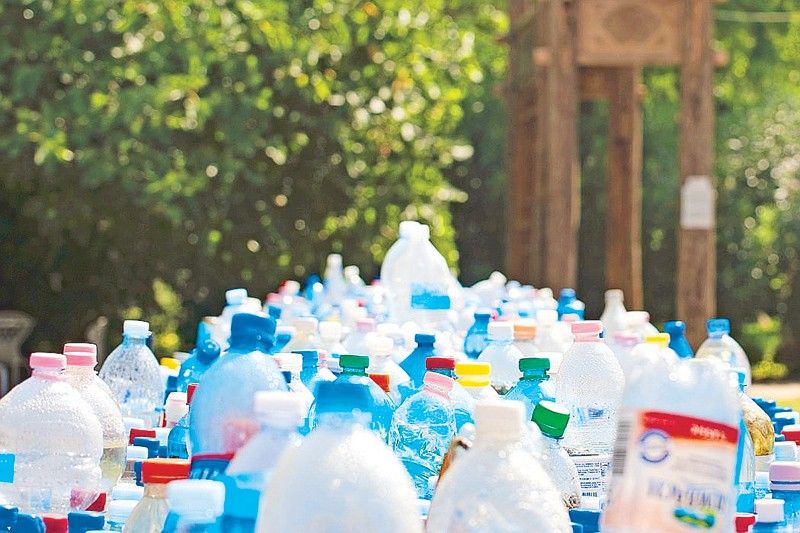'Do good' for you and the planet


Heavy rains, flash floods, and wildfires. The extreme weather conditions we are experiencing right now is proof that the danger of climate change is upon us. The clock is ticking. And if we don’t do anything about it, no one can protect us from environmental catastrophes. We’ll be knocked out for real.
What causes it and what can we do to prevent it?
When greenhouse gas emissions blanket the Earth, they trap the sun’s heat, making the world warmer than normal.
“Main causes of greenhouse gas emissions are fossil fuels that give us gas, heat and oil — all very essential to our lives today,” notes Viki Encarnacion, Watsons Philippines PR and Sustainability director, at the recent Do Good for Earth, Sa Watsons Ako webinar. “And while it may be impossible to totally prevent global warming, there are some things that we can do to lessen the Earth’s greenhouse effect.”
Moderated by environment advocate Anna Oposa of Save Philippine Seas, the “Smart Waste Management Towards a Sustainable Future” webinar tackled important topics such as how people can contribute to environmental conservation through 3Rs (Reuse, Recycle, Refill), the relationship of solid waste management and climate change, the impact of recycling on the environment, economy and the community, among others.

Waste not!
Solid waste management is an integral component of climate change.
“When we speak of climate change, we look into methane emissions,” says Commissioner Crispian Lao of the National Waste Management Commission.
In terms of solid waste, we normally look at methane emissions in our landfills, black carbon for the transport of our waste to the disposal facilities, as well as open burning of waste.
“In dealing with climate change, we have to focus also on how our own waste would contribute to it,” notes Lao.
In the Philippines, we have the Ecological Solid Waste Management Act (RA No. 9003), which provides us with a spectrum of what we, as individuals, need to do to address solid waste management problems.
“It defines the roles of the barangays and the LGUs,” shares Lao. “The barangays are tasked to set up material recovery facilities (MRF) to deal with our biodegradable and recyclable wastes, while the LGUs are tasked to haul and properly dispose of only the residual waste.” This includes even our household-generated waste during the pandemic such as facemasks and face shields.
Did you know that in 2019, the Philippines generated about 44,000 tons of waste per day? Each one of us contributed about .3 to .7 kilograms of waste. In Metro Manila, studies show that it’s over one kilo per day. The capital city also contributed 10,000 tons of waste per day.
“Sadly, as far as compliance of LGUs is concerned, only 35 percent of our barangays set up MRF as mandated by law,” relates Lao. “And only 31 percent of our LGUs have access to solid waste or sanitary landfill disposal facilities. That’s why it’s very important for all of us to deal with the waste that we generate, so that it doesn’t end up in the open environment.”
According to Lao, the commission is advocating for a Food Waste Management program.
“We need to compost our biodegradables as much as possible,” Lao adds.
And we should all follow the five steps in the hierarchy of waste management — Prevent, Re-use, Recycle, Recover, Dispose — at home, in the office, or wherever we are.
“Let’s start by avoiding generation of waste,” shares Lao. “Bring your own bag when grocery shopping, and participate in different programs in our community that aim to reduce generated waste.”
Also, choose recyclables. Paper, plastic, glass and metals are highly recyclable. White paper, cardboard boxes and newspapers can be recycled as well.
“Thermal paper, carbon paper, photo papers are not,” shares Lao. “Paper that comes in contact with food — grease and oil — is no longer recyclable. Of course, toilet paper should not be recycled because of the potential pathogen risk.”
Plastics, on the other hand, are categorized as “rigids” and “flexibles.”
“PET bottles and shampoo containers in the form of polyethylene and polypropylene are considered rigids. Flexibles are a bit challenging to recycle. But there are recycling infrastructures for flexibles, even sachets,” notes Lao.
Glass is highly recyclable, too. Just don’t include electronic glass like light bulbs in the recycling stream, as well your ovenware.
“Ovenware contains boric oxide, which affects the recycling system,” explains Lao. “Tin, aluminum cans and other metals, including copper can be recycled.”
According to Lao, some of these recyclables are converted into building materials, school chairs, and other projects that are being done by many social enterprise groups.
There are drop-off centers in some of the biggest malls in the metro where you can bring your recyclable materials.
“It is critical for us to do our share for the environment and participate in programs that are already there,” says Lao. “Again, let’s follow the waste hierarchy as a way of life.”

Ayoko sa plastic!
Plastic Bank CEO and founder David Katz discussed what social plastic can do to help impoverished communities gain access to necessities such as food and water.
“Recycling isn’t just an opportunity to return materials back into manufacturing in the supply chain. It’s an opportunity to look at things differently. Where others saw waste, there is worth,” Katz enthuses.
Plastic Bank is working to stop ocean plastic while reducing poverty. By enabling the exchange of waste plastic for money, or blockchain-secured digital tokens, Plastic Bank reveals the true value of the material, making it too valuable to throw away. This empowers recycling ecosystems around the world, driving responsible economic development in underprivileged communities and reducing the flow of plastic into our oceans.
When asked what is the pivotal role of consumers in waste reduction and environmental conservation, Katz replies: “Every time you buy something, you vote for it. And if you continue to buy products that are polluting the Earth, that’s killing the oceans, that’s what companies will continue producing. That’s something that we have to be very conscious of. It’s truly our responsibility. Don’t forget: you buy, you vote.”
Making sustainable choices
“’Sustainable choices’ is our flagship program for our customers. But we can’t do it alone. For any program to make a strong impact, we must involve many stakeholders and that involves our suppliers and our employees,” enthuses Vicki Encarnacion of Watsons.
In collaboration with Plastic Bank, Watsons was able to recycle 833,000 plastic bottles in 2021.
“The partnership with Watsons is an opportunity for the world to bear witness to great change. It takes the bold and the authentic to do something that hasn’t been done before and we know that in partnership with Watsons, the world is going to witness the change in the communities and the lives of our collectors,” Katz says.
You, too, have the power to save our environment. Viki shares small acts that you can do:
•Walk more.
•Bike more.
•Turn off the lights or use alternative energy.
•Plant a tree.
•Consume less.
“But if you really need to buy something, consider more sustainable products,” advises Viki. “And for sustainable choices, as our new brand campaign says, ‘Sa Watsons Ako!’”



















